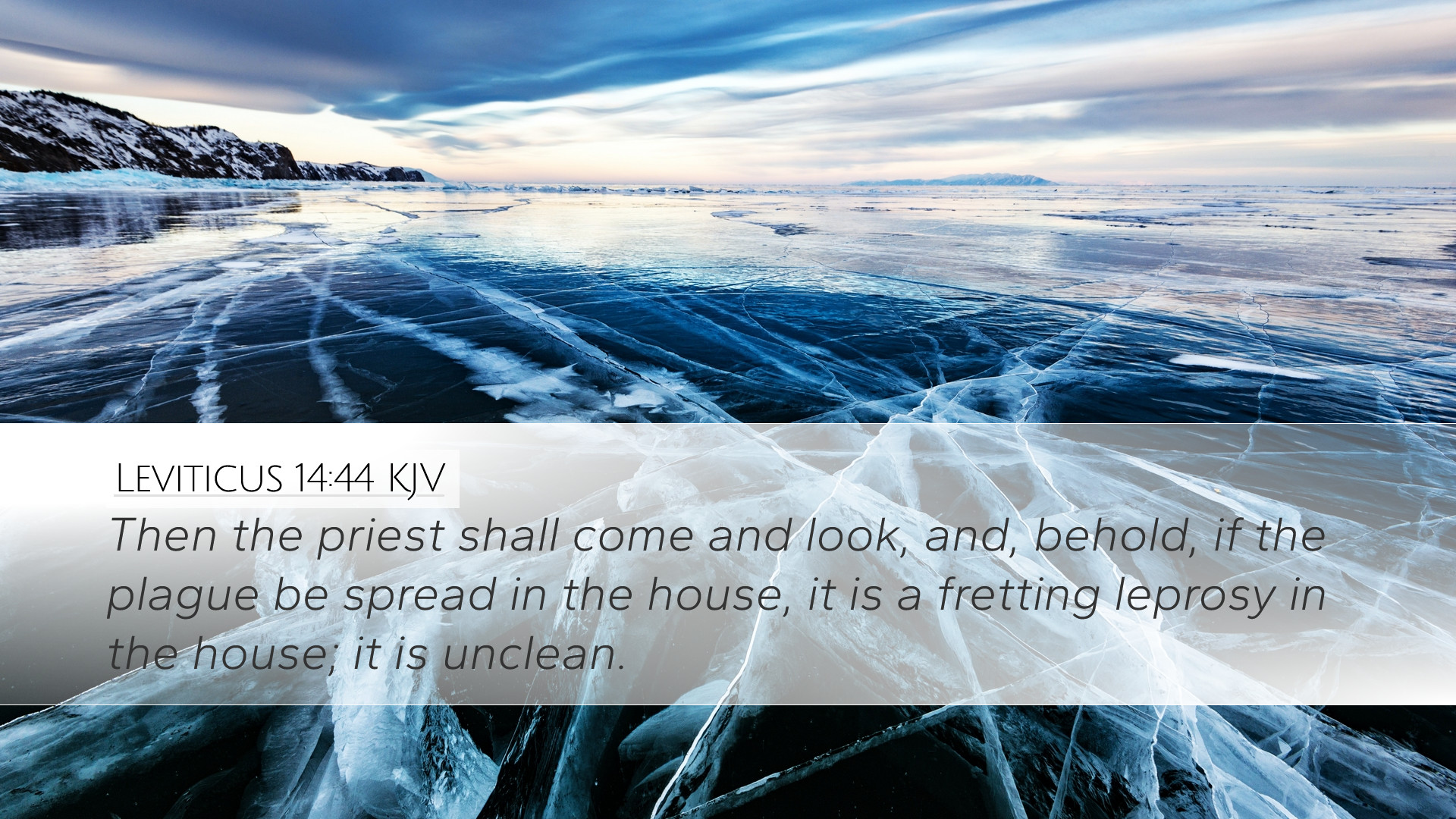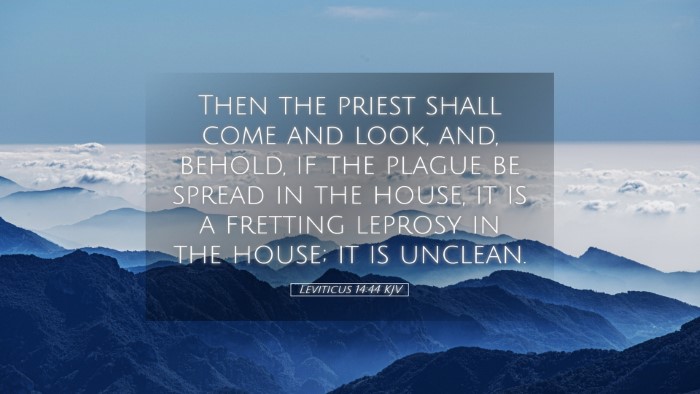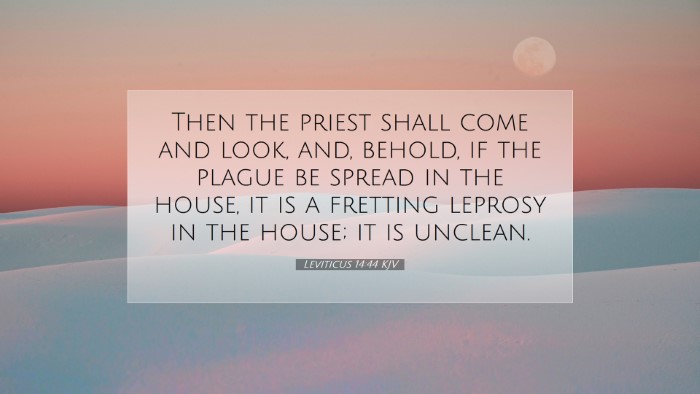Commentary on Leviticus 14:44
Verse Context: Leviticus 14:44 states, "Then the priest shall come and look, and if the leprosy has indeed spread on the walls of the house, the priest shall pronounce it unclean." This verse is part of the instructions given for the purification of leprosy, a serious condition affecting both individuals and their living environments.
Overview of Leviticus 14
The fourteenth chapter of Leviticus outlines the ceremonial laws concerning leprosy, a term that encompasses various skin diseases in biblical contexts likely including mold in homes as well. This chapter delineates the responsibilities of the priest and the procedures for assessing and declaring a person or a structure as unclean.
Insights from Public Domain Commentaries
Matthew Henry's Commentary
Matthew Henry highlights that this chapter indicates God's profound concern for purity, both physical and moral. When discussing Leviticus 14:44, he emphasizes that the priest's role is not merely ceremonial but functions to maintain holiness within the community. If leprosy spreads within a house, it signifies the need for a thorough examination to prevent further contamination. The priest’s assessment serves as a divine mandate that reflects God’s intention to uphold purity in His covenant community.
Henry notes the gravity of leprosy in the community, linking it to sin and spiritual decay. Just as leprosy represents a physical ailment, it symbolizes the insidious nature of sin, which can infiltrate and contaminate spiritual life. The inspection by the priest is portrayed as a necessary evaluation of both spiritual and physical states, emphasizing the need for accountability within the faith community.
Albert Barnes' Notes on the Bible
Albert Barnes provides a detailed examination of the priestly duties, pointing out that the priest must be diligent in his role as protector of holiness. In his commentary on verse 44, he elaborates that the spreading of leprosy in a house demands careful investigation as it poses a threat to the entire community. Barnes notes that the image of leprosy expanding signifies the notion that sin, if not checked, will propagate throughout the congregation, infesting the communal worship and spiritual vitality.
Barnes suggests that this regulation speaks not only to the physical implications of leprosy but also to the broader moral and spiritual realities. He emphasizes the importance of community standards for holiness, calling for rigorous adherence to God’s commandments to avoid the risks of moral decay analogous to physical infections. The priest's declaration of a house being unclean carries substantial consequences, reminding readers of the reality that spiritual health requires vigilance and discernment.
Adam Clarke's Commentary
Adam Clarke takes a more analytical approach in his examination of Leviticus 14:44. He draws attention to the careful procedures instituted for addressing leprosy as a reflection of God’s mercy and justice. According to Clarke, the presence of leprosy in a house symbolizes potential judgment and requires a response from the community. He notes that the priest's responsibility goes beyond merely pronouncing a house unclean; it involves guiding the people towards restoration and purification.
Clarke further emphasizes that this process implies a broader theological principle: the necessity of recognizing and confronting sin to maintain a healthy relationship with God. The unclean state of a house serves as a stark reminder of the need for continual self-examination, both individually and collectively, ensuring that transgressions do not threaten the sanctity of the community. His insights reveal the intersection of faith practices with daily life as a fundamental tenet of biblical faith.
Theological Implications
The insights provided by these commentators elucidate crucial theological implications surrounding Leviticus 14:44. The role of the priest emerges as central not only to the ceremonial laws but also to the spiritual health of the community:
- The Role of the Priest: The priest is tasked with maintaining purity, indicating the significant role of leadership in spiritual life and collective integrity.
- Community Responsibility: The communal aspect of sin is underscored; leprosy in a house serves as a metaphor for how individual sins can affect the broader community.
- Holiness and Cleansing: The text reiterates God's command for holiness, reminding believers that while impurities exist, they can be addressed through processes of confession, accountability, and restoration.
Pastoral Applications
For pastors and church leaders, Leviticus 14:44 serves as a poignant reminder of their obligation to not only preach about sin but to actively engage in the health and purification of their congregation. This passage invites leaders to be vigilant, to examine their communities for signs of spiritual decay, and to foster a culture of honesty, where sin can be confronted in love.
Moreover, it emphasizes the necessity of equipping the community with understanding regarding sin, holiness, and the path toward restoration. Pastoral care involves guiding individuals and families towards recognizing areas needing attention, thus promoting spiritual wholeness within the body of Christ.
Conclusion
In conclusion, Leviticus 14:44, with insights from Matthew Henry, Albert Barnes, and Adam Clarke, highlights the critical importance of community health, spiritual vigilance, and the role of leaders in maintaining holiness among God’s people. While this passage primarily addresses leprosy and its implications, the broader message pertains to the regular and careful examination of spiritual life, urging believers to seek purity in their walk with God.


